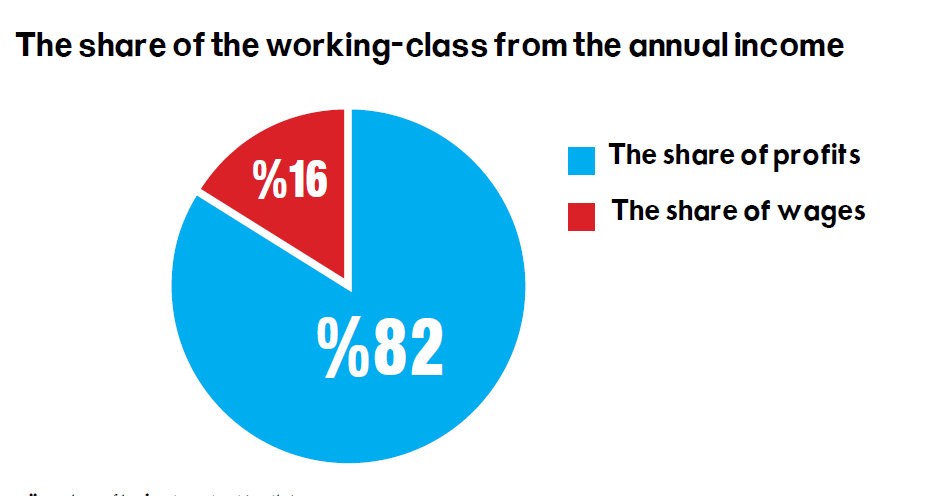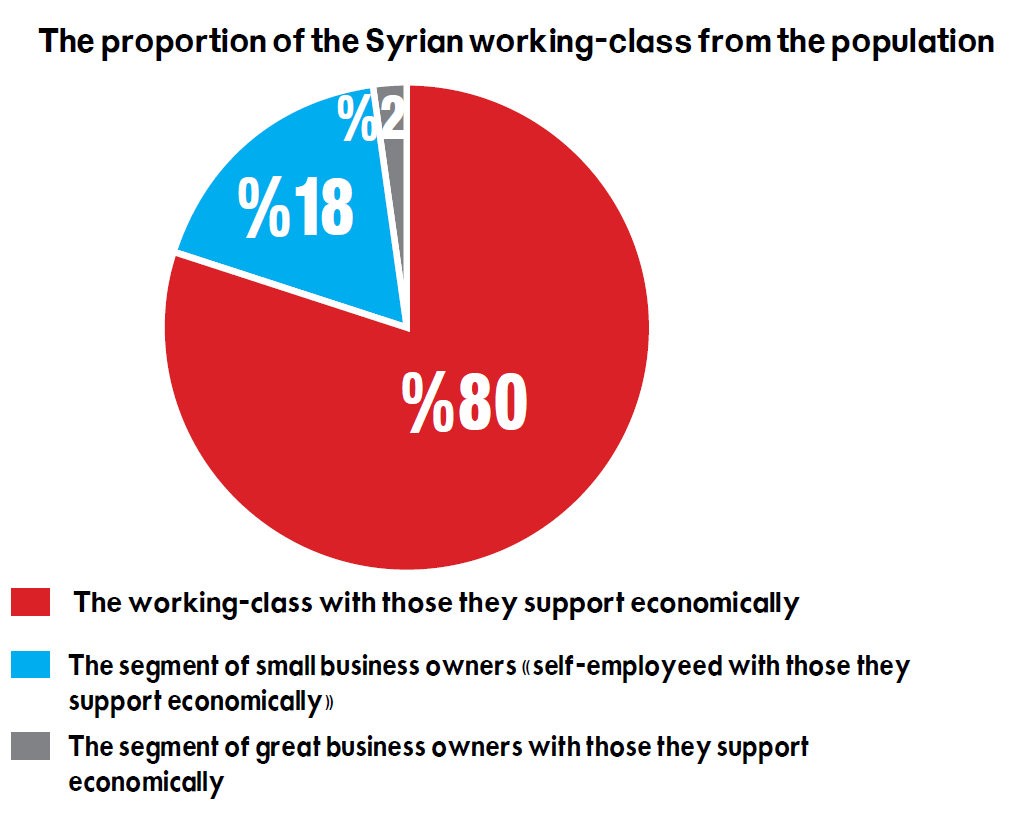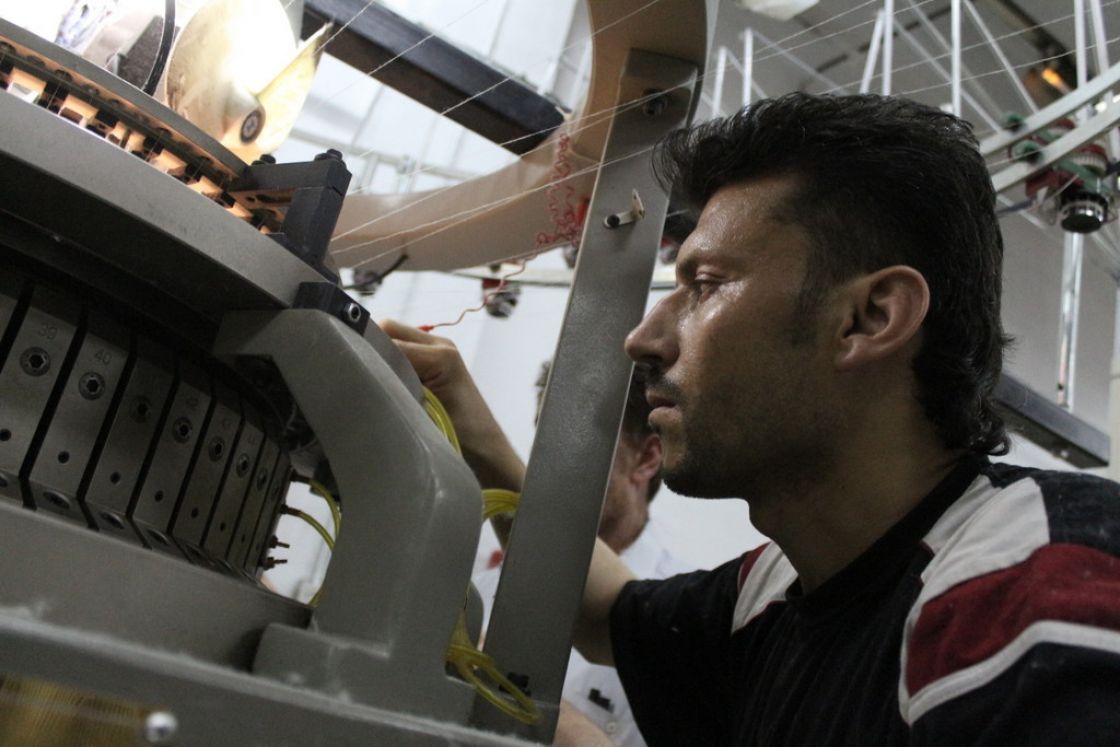- Articles
- Posted
The Syrian Working-Class: We Constitute 80% of the Population and get Less than 16% of the Income.
When Syrian business owners talk about their coping mechanisms and the continuation of their business under the extreme Syrian conditions, one saying is repeated: «the wages of workers have decreased». This fact is the only «positive factor» for the business sector in Syria, as all costs have increased: raw materials, transportation, money transfer, corruption costs and others, but workers have remained with their wages, or more precisely «with their hunger», snatching away the remnants of the Syrian production!
The average wage in Syria, at the limits of 60k Syrian pounds, has not changed despite the collapse of the value of the Syrian pound and the price frenzy during the last three years at least, which have witnessed collapses in the value of the Syrian pound and an insane increase in prices. Today, this wage does not cover the costs of food necessary for the worker to keep going alone, as the adult in Syria today needs 90k Syrian pounds per month to secure 2400 diverse calories from bread, vegetables, meat, cheese, and sweets. Those food necessities have become diminished rights for the Syrian worker, and the wage is determined on the basis of shortening life expectancy, as the low-return work years devour from the lives of Syrian workers.
The Working-Class «Who are We»?
Extensive surveys of workforces and their situation are only available from the data of the state apparatus, and the Central Bureau of Statistics and only until 2019. They also do not include wide areas from Syria: Deir ez-Zur, Ar Raqqa, Idlib, and parts of the countryside of Aleppo. However, they cover nearly 15 million of the Syrian population, and can relatively reflect some important events, some parts of which we will review with connotations on new variables. The first and perhaps the most important data is related to the size of the working-class segment from the Syrian society, and we can reach an average estimate of our number and proportion from society. According to our estimates, the size of this segment reaches 12 million out of 15 and a proportion of approximately 80% of the Syrian population.

This estimate is based on the fact that the working-class segment includes wage earners and the unemployed, with their families of course, or the average number of individuals they support economically. The number of wage earners is 2.4 million, while the number of the unemployed is nearly 2 million, and each of these is supposed to support 2.8 persons on average, which makes the preliminary estimate of the number of this segment close to 12.3 million and a proportion of approximately 80%. The remaining 20% of the population are divided into two parts: the self-employed segment which includes farmers, self-employed professionals, workshop owners, small shop owners, and those who work in trade and services, in addition to groups such as doctors and others. Those approximate 1.1 million in Syria and practically support about 2.8 million. So, less than 200 thousand people remain, and precisely 128k are business owners, according to the estimates of the government.
Our Share Per Capita: 12k Per Month!
The Syrian working-class constitutes approximately 80% of the population, and it practically gets a very small share from the Syrian GNI it produces. According to the average wage of 60k Syrian pounds, 2.4 million wage earners get 1730 billion Syrian pounds annually. This preliminary share of the income distributed on wages should cover 6.7 million people whether wage earners or their economic dependents, while the 5.6 million unemployed, who are supposed to support children, unemployed women, women who are not able to work, and students, they theoretically get nothing. 1730 billion Syrian pounds constitute a proportion that does not exceed 16% of the Syrian GNI which was in 2019 11k billion Syrian pounds. This preliminary share from the income is quite small because it does not exceed 12k Syrian pounds on average for each member of the working-class. This estimate does not mean that the families of the working-class only get these sums, but it is the basic sum that all of them get from «legitimate and honorable work», which is not enough to secure the basics of individual nutrition except at the minimum! The average share of 12k Syrian pounds for each member of the working-class means that they only get 13% of their necessary food, and they monthly receive an amount that only covers the cost of having an egg daily and less than an ounce of veal a month!

Wages are a Multifaceted Crime
This really sharp paradox between needs and wages has a wide impact, and it leads to major transformations in the nature and value of work, hence, the overall values of society. The level of economic violence pressuring the working-class with its families is exceptional, and it raises in the Syrian society a sharp tendency towards «snatching away the foundations of life» in any way no matter how harsh, brutal, or far away from «moral standards». These wages are the determinant of the urge for migration among the segment of students, as more than 1.6 million students in Syria are equivalent to 30% of workforce estimates, and most of them «do temporary work» in Syria and build up their future on the basis of the next travel step. Those wages are also a determinant of moral deterioration in society: its quest to join major cycles of corruption, where income is centralized, so that large segments of workforce work within the framework of plunder, swindling and all the crimes whose environment secures the segments of warlords, who open the door of black sectors in front of the Syrian youth as a main source of income.
Finally, these wages are the determinant for major future problems that appear in the children of today. First: the low level of income is the reason for the decline in the ability to establish families and have children, for the children of today to be responsible in the future for major tasks in fewer numbers and low qualification. Hunger wages deprive a large segment of the children of working families from their right to complete their education, and a proportion of 40% of Syrian children are outside the education process! These wages are the main determinant of the near-term fate of Syria, as it is considered a social detonator, because all this injustice cannot be without a reaction, and this reaction can be as violent as the violence of injustice.



 Ashtar Mahmood
Ashtar Mahmood